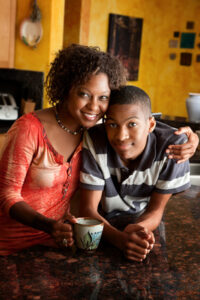Mom’s Talking Oxytocin
Research suggests that oxytocin plays an important role in relationships. Specifically, it reduces stress and aids in developing interpersonal bonds. It also seems to contribute to building trust and social understanding across the lifespan. Isn’t that something we all want for our children? Well, I have some great news.
A study published in Development and Psychopathology filmed the natural interactions between 62 mothers and their infants. They analyzed the videos to determine how well the mother accurately referred to her infant’s thoughts, feelings, desires, and perceptions. In addition, they obtained saliva samples from the infants to measure the level of oxytocin in their system after the observed interactions. Analysis of this data revealed that the more a mother talks to her infant about her infant’s thoughts and feelings, the higher her infant’s levels of oxytocin. This likely contributes to a positive and healthy attunement (attachment) between mother and child, which is known to have a long-term positive correlation with that child’s social and emotional development.
I know, I went in a roundabout way, telling you about this study, just to tell you what you probably already know. (But roundabouts are getting more popular these days.) When a mother (or any parent really) reflects their child’s emotions, they release oxytocin and develop a more intimate bond. You may not see the oxytocin flow, but you see the results of a growing relationship.
For instance, when your child looks excited and you respond with a bright, “O that’s exciting, isn’t it?” you build intimacy with your child. You also lay the groundwork for their ability to recognize, express, and mange emotions in the future. The same is true when you see your infant getting frustrated with a toy. “That’s upsetting. You’re really mad about that.” Once again, your infant feels “recognized” and validated. Their emotion has a label with which they can express it as they grow older. And, you have deepened the bond with your child.
Isn’t that one of the beautiful aspects of a parent-child relationship? We get to share observe our children’s emotions, acknowledge them and label them as we interact with them. This simple, loving interaction draws us into a deeper, more intimate relationship with our child. What could be more beautiful?

-0 Comment-